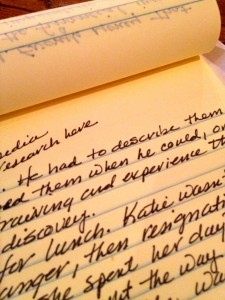
In 1999, I was driving on the New Jersey Turnpike. The car behind me tapped my bumper, sending me fishtailing across several lanes, and under a trailer truck, which sheared the roof off the car. I got out of the emergency room with a lot of stitches in my scalp, but otherwise unharmed, and then had to get home to Brooklyn, which was an adventure in and of itself.
Honestly, I don’t remember a lot of it. I recall thinking this was it, and wondering how much dying would hurt, in what seems in retrospect a surprisingly calm moment.
Since then, I’ve had trouble driving. I have panic attacks on the highway and even as a passenger, trucks pulling up alongside send my heart rate up. It took me a long time to realize this was affecting my life. It took me even longer to admit to myself I had PTSD and needed to work on it. It was very weird for me to realize that I couldn’t just think my way out of a panic attack.
So this summer I’ve been driving in when volunteering in the Clarion West classroom. It’s not a bad drive, but it takes me on a highway, and across the 520 bridge, which was way outside my comfort zone at the summer’s beginning. Now it’s a lot more endurable, but still scary, and I don’t know that I’ll ever get to a point where I feel comfortable on the terrifying part of I-5. It wasn’t pleasant when I started, and it’s still not pleasant. But I pushed myself, because I didn’t want fear to make my life smaller.
By the same token, we need to not let fear circumscribe our writing. We need to write about things that obsess and confuse and frighten us to the point of nausea. We need to tell stories about the things that scare us, and what we do when we’re scared. Because this is how we confront and transform the abysmal moments in our lives. We are the laboratories in which our stories brew and bubble, and the ones distilled from our pain will be better than the ones imported from outside sources.
You can write anything in fiction. Go for it. No one knows where your life ends and the fictioneering begins, so use the material life gives you freely, gleefully, fully. Face the themes that terrify you and write your fears out without worrying about who will read them. It may not solve them, it may not make them any less scary, but at least you’re using them. And your stories will be so much the better for it.
Enjoy this writing advice and want more content like it? Check out the classes Cat gives via the Rambo Academy for Wayward Writers, which offers both on-demand and live online writing classes for fantasy and science fiction writers from Cat and other authors, including Ann Leckie, Seanan McGuire, Fran Wilde and other talents! All classes include three free slots.
Prefer to opt for weekly interaction, advice, opportunities to ask questions, and access to the Chez Rambo Discord community and critique group? Check out Cat’s Patreon. Or sample her writing here.







5 Responses
Yes! Yes and Yes. This has been a theme in my personal life for the entire month of July. Most importantly, you cannot let others bully you away from writing about those things or worrying, as you say, who will read them.
If you think about someone reading the words, it’ll shut down your ability to write — at least that’s what I’ve found.
Nice post. I agree that it’s essential to keep the writing raw, emotional, poking into that core scary material. Your accident mut’ve been terrifying, and it’s good that you’re pushing through that.
Thank you for sharing this post on Twitter last night. It came at the perfect time for me. Much appreciated.